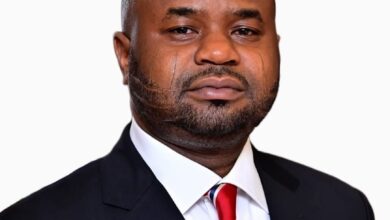Insurance growth depends more on spending power of consumers – Kari

Commissioner for Insurance, National Insurance Commission (NAICOM), Alhaji Muhammed Kari
In this interview with journalists in Lagos recently, the Commissioner for Insurance, Muhammed Kari, says insurance growth in Nigeria is more depended on the spending power of the consumers; capital adequacy; right risk pricing and professionalism among others. Excerpts:
Before the last government induced recapitalization exercise, Insurance Industry was being referred to as “poor cousin” of Banking Sector, What is the situation now?
That terminology did not start in 2005, the first ambitious restructuring of financial sector started in early 1990’s when IMF directed the restructuring of financial sector, and government appointed Technical Committee on Privatization and Commercialization (TCPC), and that committee dictated that all financial operators, bank and insurance industry were asked to increase their capital, the banks did, but insurance industry refused. They even took government to court that was when it started.
When the bank recapitalized, the banks have enough capital to even buy out insurance investment, so they are not actually poor cousins, they are children of banks. And the recapitalization exercise of 2005/2007 was suppose to mitigate that wide gap, unfortunately, at the end of it, it did not achieve what it was set out to achieve because, there were lot of compromises along the way, insurance companies were given wavers, and were allowed to continue in business even while capital verification was required of some of them. The banks with their excessive capital were able to take interest in insurance businesses, even took control of eleven insurance companies, until CBN came out with policy that they should concentrate on banking business, some of them divested, real divestment, some did not do proper divestment. But that notwithstanding, any business providing service like insurance is a public figure, because it is the business of risk taking.
It is believed that Nigeria with over 180 million population should have a very robust Insurance industry, why is the industry still backward when compared with other developing nations?
It does not only depend on population, it is more depended on spending power, which is power of consumers, if you check the poverty level of Nigeria population, it is much lower to some of those countries we keep comparing Nigeria with, level of education and enlightenment of the insured is a factor, and also, awareness of the benefits of insurance. I am sure you are aware that the insurance industry has commenced campaign to make the consumers aware of the benefits of Insurance. We believe that when this is done, it will improve on the penetration, the penetration does not only depend on the population. However, there still a huge potential because of that population size and that is why the industry now is realizing they need to do more retail, personal line of insurance against the corporate, which has almost reach its limits, because you cannot go beyond what exists, but individual classes are yet to be tapped into, and when this is done, then the penetration will increase.
Some Industry stakeholders believed that the Industry is over regulated, what is your take on this?
No, I don’t think so, go and ask any operator. They used to say over regulated three years ago, but not anymore. Insurance is a business that is licensed, and any business that is licensed will have to be supervised. Regulator set out the Operating rules and ensures everybody operates within it. For example, majority of drivers on the Nigerian roads are not licensed drivers, they just take car and drive, from being thought privately, most of them don’t go to driving school, no learners permit, but the day the VIO comes on the road to check, they will complain of their disturbance, that is the perception of any illegal operator, so even the licensed companies, who had been licensed by regulator, you want them to have free hand to operate without rule, it doesn’t work like that, that can be dangerous.
It is a known fact that huge management expenses in the books of Insurers are responsible for their low profitability, what is NAICOM doing to tackle this?
If I may answer the second part of your question is to allude to the fact that, the industry was recapitalized in 2007 and the following year there was financial meltdown internationally, which affected the insurance stock, with other stocks. Agreed, some have marginally bounced back, but the control of management is the responsibility of the board of directors, not that of regulator.
How should the industry address the issue of Quacks activities?
Who is a quack? There is a different between what people assumed as quack in other profession and those who are quacks in insurance. There were days when you have certifications and documents of insurance companies that are not licensed in circulation, not any more. You find people faking genuine company certificates, genuine company’s documents; so, they cannot consider those as quacks, you can just consider them as criminals. And they are not part of, because a quack is a professional who doesn’t do his job properly. Those are not professionals, they just come into the industry to fleece on the big names that operate, and you find most of the big names being counterfeited more than the small name. Technology is helping us a long way, we are trying to conclude on our portal now to ensure every business is registered through that portal, so illegal business can easily be identified. As it is now, the policeman on the road has the ability to check whether insurance policy is genuine by just using some technological gadgets, so we are getting there. Technology is helping us and the market associations are also working together to ensure that they fight against such activities.
It is believed that one of the major challenges of Insurance Industry today is the issue of Risk Pricing, what precisely is the Industry doing to tackle this challenge headlong?
It is not a matter of believe, it is factual. That is why we have released minimum premium rate for certain classes of business because we feel is not up to the companies to just charge anything, because there are some expectations to pay some liabilities. If you don’t charge right premium, you will not be able to pay your liabilities and you will not be able to meet your expectations. So we have already dictated this, which has always been in the law, but never enforced, the minimum on certain classes of business. It is not in the interest of the companies to continue charging this, because it always has effect at the end of the day on their ability to pay claims. So, that has been taken care of to a large extent.
Obviously, it is your desire as the Commissioner to see Insurance Sector as an Industry Contributing immensely to the growth of Nigeria economy, what is the Commission doing to see this dream come true?
Those are the things we have been doing recently. We have identified that, to improve the penetration of insurance, you have to have a change of perception of the consumers and all stakeholders. So working with the market, we have agreed to do the Marketing Awareness campaign which had been started. We also identified that we need to open more distribution channels, because at the moment, we use the basic which includes the Brokers Channel and the Agency Channels which is not seriously explored. So we are introducing many other channels through which business can come like baccassurance, like NGOs, like Micro Insurance agents, and we are also opening up to classes of financial inclusion like micro insurance, agric index insurance and takaful, these are all new initiatives that have happened in the last couples of months. We believed there is already optimum saturation from what can come through the Brokers, so we are looking for any other source, we have identified those sources, we have released guidelines, we have released new improved guidelines of the operation of such classes of insurance, and I believe it will have some impacts. Then, the next level is to develop the insurance companies themselves and that is why we thought of categorizing them appropriately, in their areas of operations, so that we don’t have small companies doing big business, and that’s a mismatch of their funds.
We don’t want company cases where insurance is given, but claims cannot be paid. It is going to tarnish the image of the industry. These are all the efforts that are now coming to fusion, and we believe these result will be seeing before the end of the year, and by the initiative we have released, categorizing the insurance operators into three tiers, first tier with their own capital limits, the second tier and the third tier. Each tier has classes of business they can underwrite. We are not asking anybody to bring capital because the capital market is not buoyant, but if you want to go beyond your tier, then you have to increase your capital or you merge with another, we believe it will bring good synergy in the industry.
Then, hopefully, we will see merger of Companies very soon?
Very likely. And it doesn’t have to be, because companies can decide to operate in the existing tiers they find themselves.
Insurance Industry lacks accurate data, any step towards the direction of having accurate data to work with?
If insurance need data to work with, they have to create their data. They have to ensure they collect their data beyond what is expected from federal office of statistics. And the industry, you can agree with me, has gone a long way to doing that, they have a database which they use for motor insurance which they have extended to marine insurance also. Virtually, all vehicles insured on third party, you can check on phone whether it is genuine or not. But we as regulator are developing a portal where every class on business will be registered through that portal, so at a glance, any day, you can know how many policies are issued for how much, how many claims are being paid, how long did it take, you can know all that analysis. And with the synergy we have been trying to create between the regulator and operators, that is going to be very easy when it’s completed, data is going to be available and without data, you cannot make good projections.
Where would you like to see the Industry in the next ten years?
In the top of the Nigerian economy, obviously. In other economy, it is leader, insurance companies own the banks, they own the financial sectors. They provide long term funds; those are live policies and annuity policies. And Nigeria used to be like that too, because there was a time when insurance companies own banks, there is a company that own three banks; still there are companies that have major interest in banks. And that is the position of insurance companies and that is where I hope they will be in the very near future.
On a personal note, could you tell us how it has been serving as a Commissioner for Insurance?
Stressful! Very stressful. Stressful in the sense that operators are suspicious of you, government has a lot of expectation from you, and consumers have a lot of expectation from you. They expect you to deliver, why the circumstances are difficult, but the reality of it is that, it is a challenge that you will love if it is your undertaking, and insurance has been my life, I cannot deny that I don’t love being in insurance. I have retired two times, I have come three times, what can I do?
So, after being a commissioner, what next?
Retired Commissioner!





